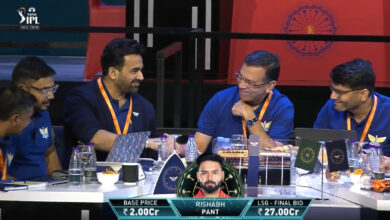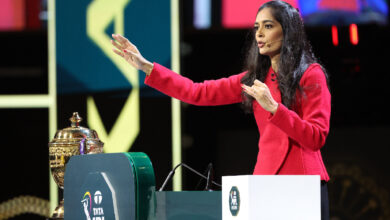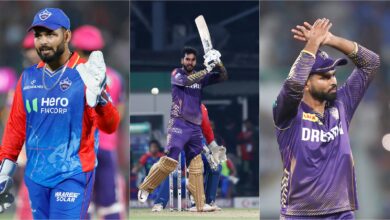Shubman Gill to Rishabh Pant and Ruturaj Gaikwad, IPL 17 is the season of young Indian captains | Ipl News

This is the season of Indian captains in the IPL. Indians helm eight of the 10 franchises. Among them, Shikhar Dhawan is the oldest at 39, and Shubman Gill the youngest at 24. Seven of them are in the 24-30 age range. Apter then would be to call IPL-17 this the season of young Indian captains.Some are regulars in the national team; some semi-regulars. Some hyped as future talismen; some circulating on the fringes. This IPL for them, thus, would be more than just about excelling in their primary skills, but also a stiff examination of leadership skills, a testing ground, an audition.
Even more so because the prevailing nucleus of the country’s leadership is ageing. Rohit Sharma, the all-version skipper, turns 37 this year, Virat Kohli, his predecessor, is 35. So are other seniors such as Ravi Ashwin and Ravindra Jadeja. The stage, thus, is set for the younger lot to assert their captaincy stakes. No statement would be louder than winning the IPL title.
One already has—Hardik Pandya. In his two IPL seasons with the Gujarat Titans, he has held the trophy aloft once and ended up a narrow silver medall another time. In those two years, he dispelled doubts about his leadership mettle. It was not a crown that he felt uneasy, but one that harnessed the finer virtues, the subtleties of his persona.
He lifted his batting and bowling, so much so that Wasim Akram called him the best all-rounder in the world. On the field, he reprised MS Dhoni’s fabled cool and Virat Kohli’s intensity. The tactics were shrewd, the handling of youngsters mature. A precocious talent that seemed lost returned as double the player he was.
To capture the effect he had on India’s selectors, he was handed out IPL captaincy on those tours Rohit Sharma sat out. This year, he would return to his former club Mumbai Indians and displace Rohit as the captain. It was a symbolic moment because he was replacing someone whose leadership skills came to the fore when leading an IPL franchise.
Hardik Pandya (left) has replaced Rohit Sharma as Mumbai Indians captain. (File)
All five titles Mumbai Indians won came under Rohit’s guidance, and he would invariably lead his country. Rohit, thus, was the first great Indian captain the IPL moulded. The greatest, of course, was Dhoni, but he had already won a World Cup when he took charge of Chennai Super Kings. The subsequent titles with CSK embellished his halo and spun the legend. It also helped him land captaincy in ODIs and Tests later, passing a clutch of senior hands such as Virender Sehwag and Harbhajan Singh.
Similarly, Hardik has leapt over the more experienced KL Rahul and Ravindra Jadeja, leading India in 16 games. He is widely touted to replace Rohit in white-ball cricket, though his propensity to court injuries means a second-line needs to be groomed. One of them is Rahul, who at various junctures of his career has been a deputy in ODIs and Tests.
Though his Punjab Kings days were forgettable—winning 11 and losing 14 with an anarchic team—his stocks soared with Lucknow SuperGiants, which reached the playoffs in both their appearances. An improved finish thus could bolster his captaincy ambitions, especially in red-ball cricket. The format could be different, but the stamp of a true leader could be gauged from any format. It could lock his spot in the T20 World Cup squad.
For Gill, Ruturaj Gaikwad and Rishabh Pant, it’s a plunge into the unknown. None of them come with extensive captaincy hory. In a sense, it’s a flawed argument. Dhoni had barely managed Jharkhand when he was chosen captain of his country. Neither had Virat Kohli or Rohit Sharma. But both had led their franchises before they became India’s captains. That is a certain trend these days. Busy international players as they are, they hardly get to spend time in domestic cricket. The IPL is the closest to a captaincy audition, besides the obvious signs they show in India’s colours.
Lack of experience thus is not a deterrent. Rather, as Karsan Ghavri told this newspaper when discussing Titans’ decision to hand over the captaincy to Gill, these players would grow with experience. “I personally feel that it will be a great learning process for him. I am sure he will grow as a player. I hope that he will handle the pressure well,” he had said.
In the present landscape, Gill is India’s most promising batsman, destined to become their figurehead in the future. He can score a lot of runs, tough runs, vital runs, for match-winning causes, but the biggest question would be if can juggle with the multiple roles he has to perform. Like helping bowlers set the field, making the right calls at the right time, judging the quality of players, man-managing, attending long meetings with the support staff, taking decisions that influence a game, and so forth.
It could be an exhausting job, as Shane Warne, whose Rajasthan Royals won IPL-1 with a group, said after winning the trophy: “You could be flying every other day, and you have to plan a hundred different things and at the end of the day win games. To me, the IPL was one of the most challenging tournaments I had played. Hence, when you win the title, it’s sweeter.”
Gill’s IPL colleague and a veteran captain himself, Kane Williamson, primes him to succeed. “It is really an exciting opportunity for Shubman, a world-class player and a great thinker of the game as well,” he told PTI. He is at least returning on the back of runs in the England series, unlike Pant, who reacquaints with competitive cricket after 15 months, post a horrific car accident. And he assumes the keys of the most underperforming IPL franchise, Delhi Capitals, who finished fifth and ninth in the last two seasons.
At the new Mullanpur Stadium, Delhi Capitals’ captain Rishabh Pant will mount a comeback to cricket after over a year on the sidelines. (Express Photo KamleshwarSingh)
Like most, Pant’s captaincy experience is thin. He had stood in for Shreyas Iyer in some games in 2021 and tagged them to the top of the table, before losing both the playoffs. He has led India in T20s in five instances too, and with a naturally unruffled disposition, you would expect him to take on the job with a smile. He said he would rely on old advice from Dhoni. “Once Mahi bhai said, ‘focus on the core subject. There are nerves, there’s excitement’. Right now, I have very mixed feelings. So, I don’t want to think too much and put pressure mentally. Just keep it simple, [take] one thing at a time. If you focus on cricket,” he told Jio Cinema.
Pant has seamlessly fitted into the big boots of Dhoni in international cricket. Gaikwad would wish for the same for the five-time champions. Anointing him the captain was not a decision out of respect or whim, but a well-planned one which has been in the making for two years. He would have the support of Dhoni as well as other seniors and dressing-room analysts. But in the end, he would be alone in the middle, he would have to make decisions on his own and hold himself accountable for makes and defeats. Pressure would ratchet up, he is inheriting the heaviest of crowns in Indian cricket. There lurks the hory of Ravindra Jadeja’s captaincy faux pas too. Jadeja is a classic case of how stormy captaincy dented his image as a leader.
Chennai Super Kings (CSK) captain Ruturaj Gaikwad with teammate MS Dhoni during a training session ahead of the Indian Premier League (IPL) 2024 cricket match between Chennai Super Kings and Royal Challengers Bengaluru, at MA Chidambaram Stadium, in Chennai, Thursday, March 21, 2024. (PTI Photo)
But Gaikwad, those who have seen him closely detect a Dhoni-like spark. “Like Dhoni, he is very calm. He is actually very calm when it comes to handling the pressure like Dhoni and he is a very good reader of the game and as I said earlier, he is very observant and I think people are drawn to him because of his nature, character and personality and they like being around him. He has got some excellent leadership qualities,” Mike Hussey had once said. A clutch of impressive results could even make him an India regular.
As could be the case for Sanju Samson and to a lesser extent, Shreyas Iyer. Samson, a leader with quiet authority, had come close to steering Rajasthan to the title, but for last-step implosions. The arcs of their stories, the club and their captain, have been similar. Both tend to fluctuate between the banal and sublime. The year before, they finished second; last season, they missed out on the playoff just two points. Another season without a play-off could force Rajasthan to seek captaincy alternatives. With the likes of Dhruv Jurel and Jitesh Sharma bursting forth, Sanju’s hopes of reclaiming his spot in India’s T20 squad too could dwindle.
The riding is high for Iyer too. He has not always matched his talent with output, his reluctance to turn up for domestic cricket forced the cricket board to cancel his annual contract. But he could salvage himself if he could lead Kolkata Knight Riders to something memorable. His sojourn as DC’s captain was not a disaster, he shepherded them to their first IPL playoff in seven years. It was also his most prolific season (539 runs). A repeat would do him and KKR a world of good.
IPL 17, thus, could be the season of the young Indian captains. And at the end of it, some will be made and some broken.







